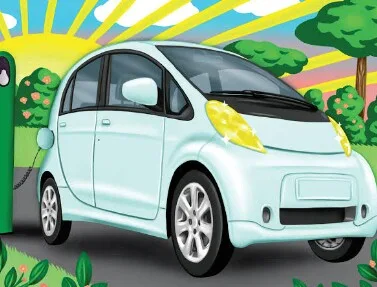Electric Vehicle
Austria is driving towards a greener future
Austria, a country renowned for its breathtaking landscapes and commitment to environmental conservation, is embracing the transition to electric vehicles (EVs) as a key step towards sustainable transportation.
With its robust charging infrastructure, supportive policies, and innovative initiatives, Austria is driving towards a greener future. In this article, we explore Austria's journey towards electric mobility, examine the driving factors behind its success, and discuss the environmental and economic benefits that EVs bring to the country.
Supportive Policies and Incentives
Austria's government has implemented a range of supportive policies and incentives to encourage the adoption of electric vehicles. Financial incentives, such as purchase subsidies and tax benefits, make EVs more affordable and appealing to consumers. The government also offers incentives for the installation of private charging stations, further enhancing the convenience of owning an electric vehicle. These measures are aimed at accelerating the transition to sustainable transportation and reducing carbon emissions.
Expanding Charging Infrastructure
Austria has invested significantly in the development of a comprehensive charging infrastructure to cater to the growing number of electric vehicles on its roads. Public charging stations are strategically located in urban centers, shopping centers, parking lots, and along major highways, ensuring that EV owners have easy access to charging facilities. The focus on expanding the charging network, including the deployment of fast-charging stations, addresses range anxiety concerns and enables longer trips. Austria's commitment to a robust charging infrastructure is crucial in promoting electric mobility.
Environmental Benefits and Carbon Reduction
The adoption of electric vehicles in Austria brings significant environmental benefits, primarily in reducing greenhouse gas emissions and improving air quality. EVs produce zero tailpipe emissions, contributing to the reduction of carbon dioxide and other pollutants compared to conventional combustion engine vehicles. By replacing internal combustion engine vehicles with electric alternatives, Austria is actively addressing climate change and working towards achieving its carbon reduction targets. The integration of renewable energy sources in the charging infrastructure further enhances the environmental advantages of electric vehicles.
Technological Advancements and Innovation:
Austria is a hub for technological advancements and innovation in the electric vehicle sector. The country boasts renowned automotive manufacturers, research institutions, and startups that are actively contributing to the development of electric vehicle technology. Collaborations between academia, industry, and government entities foster innovation and drive advancements in battery technology, charging infrastructure, and smart mobility solutions. Austria's commitment to technological progress positions it as a leader in the electric vehicle revolution.
Economic Opportunities and Job Creation
The transition to electric vehicles in Austria presents significant economic opportunities and job creation. The growth of the electric vehicle industry stimulates investment, research and development, and the creation of skilled jobs. Austria's focus on domestic manufacturing and supply chain development for electric vehicle components fosters economic growth and supports the creation of employment opportunities. Moreover, the expansion of the charging infrastructure sector and the integration of renewable energy sources contribute to the development of a sustainable and resilient economy.
Austria's commitment to electric vehicles showcases its dedication to sustainability and environmental preservation. Through supportive government policies, investments in charging infrastructure, technological advancements, and a focus on innovation, Austria is driving the transition towards sustainable transportation. The environmental benefits, improved air quality, and economic opportunities presented by electric vehicles position Austria as a leader in sustainable mobility. As the country continues to promote electric vehicle adoption and advance its efforts in decarbonization, it sets an inspiring example for other nations to follow in the pursuit of a cleaner and more sustainable future.
Implementation of Latest Technology of Electric Vehicle in Austria
Latest Technology of Electric Vehicles in Austria
| Feature | Austria |
|---|---|
| Market Share | Increasing market share, with a growing number of electric vehicles on the roads. |
| Government Incentives | Strong government support, including tax breaks, subsidies, and charging infrastructure development. |
| Infrastructure | Expanding charging network, with public charging stations available throughout the country. |
| Leading Brands | Popular brands include Tesla, Volkswagen, and BMW, along with domestic brands like Audi. |
| Environmental Focus | Austria has ambitious climate goals and prioritizes sustainable transportation, making EVs a natural choice. |
| Challenges | High costs, limited driving range, and concerns about battery life and charging infrastructure are some of the challenges facing the EV market in Austria. |
| Unique Initiatives | Austria has implemented unique initiatives, such as electric buses and electric taxis, to promote sustainable transportation. |
| Future Outlook | With continued government support and advancements in technology, the EV market in Austria is expected to grow significantly in the coming years. |
Here are some general trends and advancements in EV technology that have been observed globally:
1. Increased Driving Range: Electric vehicles have been improving their driving range over time. With advancements in battery technology, many EV models now offer longer ranges, reducing range anxiety and making them more practical for everyday use.
2. Fast Charging Infrastructure: The development of fast-charging infrastructure has been a focus in many countries, including Austria. High-power charging stations enable faster charging times, making long-distance travel more convenient for EV owners.
3. Enhanced Battery Technology: Battery technology continues to evolve, with advancements in energy density, longevity, and charging speed. Newer battery chemistries such as solid-state batteries and lithium-sulfur batteries hold promise for further improving EV performance and reducing costs.
4. Electric Vehicle Models: Automobile manufacturers worldwide are introducing new electric models with innovative features. These models often incorporate advanced driver-assistance systems (ADAS), improved connectivity, and enhanced user experiences.
Please note that specific advancements and technologies in the EV sector may have progressed since my knowledge cutoff. To stay updated on the latest technology and developments of electric vehicles in Austria, I recommend referring to automotive news sources, industry publications, and official websites of EV manufacturers and research organizations operating in Austria.



